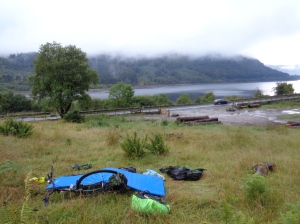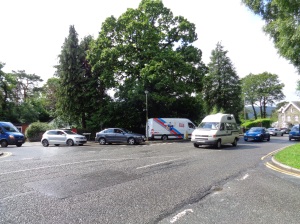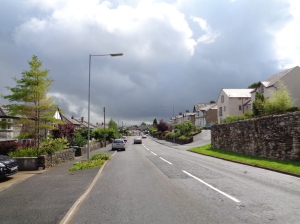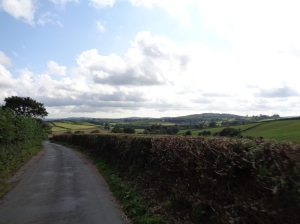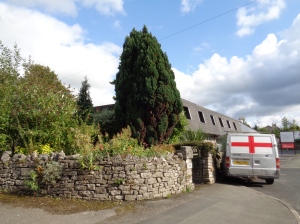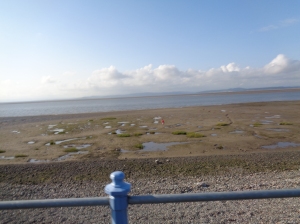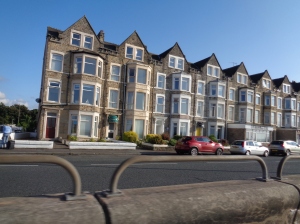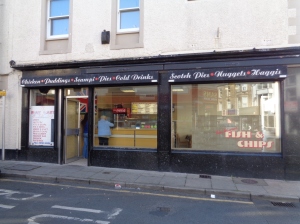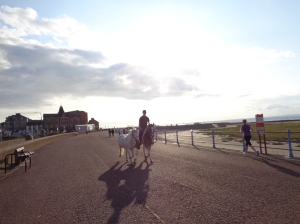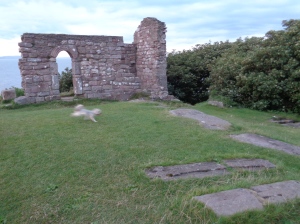‘Nothing is assured’ – Sonya, Morecambe.
Mid-morning, and the rain’s falling hard on my tent. Its light and rhythmic percussion wraps into my dozes like a thousand tiny mallets pattering against a vale of cotton wool. Droplets condense and form on the inside, and drip drop drip down onto my sleeping bag. In the course of the night, the lower half of the tent has flooded and most of my stuff is soaked through. My feet are freezing, but most of me’s unscathed. For around an hour I sit inside that tent, listening to the rain, wondering when it will take a pause.
At last, a break in the showers. I dash out into the nearby forest to find a discreet spot for my ablutions, then return to pack up. The rain’s still paused – great! I combine desperation with opportunity and attack my bike’s rear gears with a screwdriver. Eventually some combination of twists and fiddles has the vehicle moving as it should again. I celebrate with a few bowls of granola and just the most wonderful view of Lake Thirlmere. Mists hover above in thick tufts, their reflections on the water’s surface giving the impression of the imminent collapse of the heavens.
There’s a thick queue of cars snaking down below me and my encampment at this disused lumber yard. How little I envy them. Here there is the chill airs, soaked shoes, an unsteady bike and the promise of more rain. But there’s also the open road, the songs of the wind in one’s ears, the pleasure of discovering by your own determination the most extraordinary landscapes unknown to the imagination. Seeing and feeling it all for good or ill, or getting lost then discovering a new way, on your own terms. Feels so good!
The traffic this morning is just awful, a treacle trail that trickles up into the village of Grasmere. Any kind of pastoral joy that might be found in the place William Wordsworth called ‘the loveliest spot that man hath ever found’ quickly washes away in the fumes and fug. Coaches and cars cram into the road and push me off. Could someone in Cumbria council consider setting up a park and ride service from Carlisle? It’s just miserable cycling through here, and it appears I’m the only two-wheeled fool attempting it.
There’s not much to Grasmere, and it appears like many other small rural villages across the English countryside. Wordsworth’s Dove Cottage attracts most visitors. Today there’s a coach party from India being led by a middle-aged Russian woman, herding them along with a red umbrella raised aloft. ‘It’s not worth paying to get inside, but why not go into the gift shop?’
I take a photo for one couple, but it feels pretty dubious about it all. It’s another place to tick off. Put your hand up who regularly reads poetry? Take a photo and get back in the car, switch the radio back on, tap a code into your satnav and switch off your thoughts. You’re on holiday, so why would you want to think?
It’s not that though. It has me wondering why I can’t tell these people: but isn’t Wordsworth shite, or I think Shakespeare’s boring? At best, uttering these words will have people thinking that one is playing up one’s irreverence, being cheekily antagonising. But one can say Beckett, what bollocks or Joyce just goes and on and still be admitted into polite conversation. Some figures have become absorbed into an establishment of good taste, and that is bothersome. Karl Popper said that the basis of scientific reasoning is determining what is falsifiable. The most excessively dull and silly touristing revolves around these holy goats. So who’ll stick their head above the parapet and say….?
We dribble out of Grasmere and land into Rydal, another small village where marquees and cut hedges are the preparations for a dog show. There’s not much to report, just a similar kind of rural village as one might find in Surrey or Sussex. But Ambleside, my word, the village is bursting with tourists and their traffic, like a Saturday afternoon in some major town centre. I weave between two filled lanes of traffic and enter a settlement full of hiking shops and tea rooms. I wade through walkers with spiky poles and absurd get-up, old dears with zimmerframes meditating ponderously from benches at the morning scene, and visitors from every continent of the world entering and then leaving the visitor information centre with a look that speaks both confusion and disappointment. I give directions to one Chinese girl who has just come from the tacky tourist bus that haunts these hills, then decide to make an escape.
Let me come clean, and utter something more offensive than even Wordsworth’s shite. I hate the Lake District. If this is it, then it has been immensely overcrowded, touristy, and just disappointing. I’d been given some warning beforehand by a couple of others along the road. On the road to Cockermouth I passed two white cycles, memorials of road deaths, Carlisle FC scarves fluttering against their handlebars. I hadn’t expected this, a kind of prostituted heritage in country lanes swollen with cars.
Perhaps the rain is aggravating a low mood?
I exit Ambleside along a market lane (to be fair, take away the excessive shops and numbers and there’s probably a nice 18th century market village here), and back out into the countryside. There are fleeting glimpses of delightful and idyllic scenery, and some of the views of the distant peaks are a little stirring. The pleasure of the Lakes is one for walkers and explorers, not for road-users. The villages here aren’t sufficient to merit following major roads into them, and I’d point any curious cyclist to devise their own route among the quiet country roads that do crisscross these parts. But that view from Thirlmere was worth it…
Windermere is similarly congested, another village given over to Mammon, his massive landrover, and iPad-waving brats. A tourist bus takes a turn for Bowness, but I avoid it, sick of the traffic, and of having to jump off the road to let a queue of coaches and cars get past me. It’s frustrating and dangerous cycling, and I’m glad to finally escape into Kendal, a small market town situated in a valley.
Kendal is totally given over to shopping. Every available space is devoted to chain stores and commerce, with a small market in its centre giving the lie of crafts and trade to an otherwise over-sprawling shopping district within 18th century market town confines. But there’s no garish malls or retail parks, and there’s charm about the place. With some responsible development, it could be re-cast into somewhere more culturally and socially interesting, say like Alnwick. But that would be out of character for a market town for a wide surrounding area that’s no doubt seen countless characters, hustle and hurly-burly over the centuries. Enjoying my stroll around the place, I find a small café down an alleyway called Emma’s Yard 46, and get down to a little writing.
‘Oh it’s mad out there. It was a battle just to get from the town hall. Holiday-makers!’ The café mainly attracts locals, and their verdicts are often harsh but fair. ‘He’s in a death metal band. Death as in you’ve got to be deaf to listen to it.’ I lunch well here and enjoy my time, and only leave when the café has to close up around 4pm.
This ride back into England has been testing and difficult. What exactly is this place, after the wonders and majesty of Scotland? Supermarkets that sell the same things wherever in the country you are. Houses that could be anywhere: semi-detached white or grey pebble-dash, mock tudor gabling, bay windows, sky TV, international car on the driveway, a locked gateway, over-manicured roses blooming in carefully-allocated holes in the paving. A certain degree of reserved casual friendliness – mate, love, dear. There’s the St George’s flags still fluttering in the suburbs, besides the German discount supermarkets and the Chinese takeaways. To quote Harry the Duck, a skinhead interviewed by Dick Hebdige back in the late Seventies,
‘This is England! And they don’t live here.’
Who does live here, and why, and who shouldn’t, each seem to wrack the unfortunate parochialism and insularity of these parts so far. Maybe it’s just my mood, but after Scotland, I’m finding aspects of Englishness as it is popularly expressed either awkward or awful.
I follow a nice rural path out of Kendal and through the country hamlets of Natland, Sedgwick and beyond. These are thin little lanes wide enough for a horse and cart, but not much else. The rain has cleared and the ride is delightful. Cumbria is now left behind, and the road enters Lancashire, accompanied by thriving farmlands whose rustic reveries are interrupted by slithers of early 20th century housing here and there, and plucky Milnthorpe, another small market town remarkable in its own confidence about its unremarkableness.
I rejoin the busier A6 and thread via patches of farmland and the occasional settlement, Beetham and then Carnforth. Finally the road becomes more developed, and more interesting, when it finally twists round into Morecambe.
Morecambe is a faded but still charming seaside resort on the Lancashire coast. What immediately strikes the traveller is the huge and magnificent bay immediately to one’s right as one follows the wide and still-majestic promenade from the north. It feels like it goes on forever, and the quality of the light is just unparalleled. Perhaps the sea and the right shaped bay can bring this out, possibly, as there is some superb light across the Hebrides and northern Highlands, and artists have long been drawn to other coastal places like St. Ives. But perhaps there’s something more here?
When the tide’s out, one can walk out onto this bay for miles, but at great risk. The bay quickly floods again with flows of water that rise faster than one can evade them. Many have drowned out here, caught in surprise by the terrible tides. I’d first heard of Morecambe through the infamous deaths of twenty-one Chinese cockle pickers on 5 February 2004. Inexperienced and unable to speak English, these illegal immigrants were exploited by locals and organised criminals in their own country and met a tragic end one night out on the bay, caught by sweeping tides in a country and environment they’d not been prepared for. The ‘Devil’s Beach’ was how one Chinese newspaper broke the story the following day. There’s countless other stories of drownings and disappearances, yet in the early evening light one gets little sense of the bay’s lurking menace.
Further down the promenade, more of the faded Victoriana and aspirational Art Deco design comes into view. There’s an ugly Seventies block at first, but past one encounters a parade of early 20th century and Victorian shops, offering candy, sticks of rock, fish and chips, cafes, and a surprising abundance of Chinese takeaways. There aren’t so many pubs or amusement arcades here as other seaside resorts like Yarmouth or Bridlington. Morecambe feels a little more dignified, but still trapped in its history. The hotels and boarding houses have gone, and other aspects of the town’s identity are beginning to unravel. The statue of Eric Morecambe on the promenade is bittersweet, a cheery reminder of the town’s illustrious and aspirational past, similarly captured in the works of Alan Bennett, who reckoned he was conceived in a boarding house either here or Filey!
They invented lettered rock and the helter-skelter here, apparently. And apocryphal rumours suggest that even the game of bingo had its origin, or at least its popularisation, here too. The piers have been washed away and the helter-skelter’s gone. Even the outdoor pools where Miss World contests were held during the 50s have been dismantled and taken down. This was once a huge holiday resort. ‘Bradford on Sea’ it was called in its prime during the first half of the 20th century, attracting industrial workers with a little spending money for some fresh air, exercise, and fun on the beach. Some signs of those times still remain, in the chunky bay windows and high steps that lead into Victorian townhouses that were once hotels, or towards the western side, boarding houses.
There’s the Winter Gardens, a large Victorian theatre and ballroom that’s been near-derelict since 1977, but still carries a majestic presence over the slightly shabby sea-front. There’s also the Midland Hotel, an extraordinary Art-Deco building that stands right on the edge of the promenade, a bold and pioneering Modernist construction of its time which still boasts charisma and high-living escapism today. It’s fraying around the edges, but I like the place.
Morecambe still captures much of what makes the English seaside resort so compelling and charismatic, no matter its faded facades or grubbiness. In a book I read later, Seaside Architecture by Kenneth Lindley of 1973, there’s these words which approach my feeling:
‘The English did not so much invent the seaside as respond to its nature, and even now when travel has opened up the world there is nowhere on earth where the spirit of the seaside finds better expressions than on an English beach. Some strange coincidence of climate, geology and character, accidents of time and place, have brought about that quality which we recognise as ‘seaside’.
I head back towards Blackburn’s chippie for a box of the good stuff with mushy peas, an accompaniment that only the northern chippie can get right. As I wait there’s a nosey woman in front bothering the assistants with requests to ‘smile luv’ and ‘tell us about your love life’. Some but not all of the visitors here are retired, perhaps revisiting a place that brought them great pleasure as a child, but in all the town doesn’t feel over-crowded, or too given over to the most tacky forms of attractions. Perhaps the problem is that it’s not given itself over to much at all. There seem to be few events on, and there’s no funfair or crazy golf I spot. It’s like it’s abandoned much of its intention of being a seaside resort, not wishing to struggle on without dignity as other seaside resorts have. I think I can understand it.
At the end of the promenade I spot a large shuttered up pub, a silver carbuncle of a café, and next to it, a friendly bronze-haired lady called Sonya who is kindly hosting me for the night. She’s from the town, and has a determined if at times frustrated love of the place. I drop my things back at her’s, and we spend the next few hours talking about Morecambe and the seaside resort.
Sonya’s a mine of information and anecdotes, and she’s done an immense amount of research on Morecambe’s history, particularly its use of modernist architecture. Railway companies sought to rapidly develop new seaside resorts with varying degrees of success, but great hopes and investments were placed here. Resorts aimed to be state of the art, and the use of Art Deco designs with a brazen confidence reflects the town’s own optimism during the early thirties. She shows me incredible photos of the promenade and the town in its heyday. She’s surprised that I don’t find it a particularly run-down place: perhaps the decline of Morecambe feels harder when one has grown up there. Cheap package holidays to the Mediterranean from the Seventies have killed off most of the income of these seaside resorts. Morecambe feels kind of stunned, but not altogether knocked out.
We go out for a stroll by the village of Heysham (pronounced He-shum) just south of Morecambe. The ferry to the Isle of Man sets off from here, but less well-known is a lovely stretch of wild land along the coast that we follow with Sonya’s dog Toby leading the way. At the end, just by a corner where one cliffs comes close to another, are the ruins of the 8th century St. Patrick’s chapel. It’s a delightfully spooky and creepy place, particularly with the many headstones and tall wild grasses of a cemetery and church just nearby. Our conversation turns from Morecambe, travelling, children (‘you’re always worrying about them. What if they die? What if I die? What if there’s a nuclear attack?’) to ghosts and our shared interest in weird conspiracy theories.
We find a pub and sit in the beer garden. Toby’s a lovely and playful chap, running into the pub and back out, keeping Sonya on her toes. She tells me about her work at the moment at a lettings agent. Many of the tenants she sees are ‘totally skint’, dependent on benefits, and to a degree trapped. They’re unable to work, and find themselves living in an area with a relatively high degree of unemployment, yet receiving benefits is becoming increasingly difficult. As Sonya points out to me, what good are food banks when people can’t afford to pay their gas or electricity to heat the food? She tells me about one tenant and the excessive charges she pays as part of the bedroom tax. ‘It’s like a war against the poor’, I say. ‘Did you not know?’, she replies, with a voice that speaks bitterness and sadness.
Poverty here isn’t quite absolute, but destitution is growing while remaining still hidden, and increasingly connoted with laziness and wilful ‘scrounging’. The real situation remains under the surface, invisible to the passing eye. Bad landlords, low pay and the disappearance of working rights make things even worse. Perhaps Morecambe’s uncertainty about its future, and the feeling of being trapped in between moments, just reflects the uncertainty, difficulties and frustrations of its people.
But it’s still a somewhat jolly place, and above all pleasant, friendly, if now much more quiet. We head back to her place in the west of the small town and chat into the late evening over some bottles of Lancaster Bomber made by the local Thwaites brewery. She shows me with some pride a brick, one of many that washed up on the beach from a nearby and now disused brickworks. These stones seem to reflect the town’s spirit, a little lost and adrift, but still proud, and still lovingly kept and retained in people’s memories and hearts, even when that love has been tested.
I feel so lucky and enriched to have met people along the way like Sonya, or Greg in Lochinver, or Ian in Filey – people with such expertise in their local area and its histories, people so friendly, open to strangers, kind and down-to-earth. Sonya contacted me just after reading this blog, and after an evening of great conversations and walks around this charming part of the world, I’m glad she did.
Before I fall asleep, I find these words in Lindley’s Seaside Architecture. They communicate to me, and perhaps you too, that feeling of loss and melancholia that the Victorian seaside resort presents, but also its naïve charms, its simple pleasures, and the sheer beauty of gazing out at the sunset from the promenade:
‘Electronical and mechanical wonders come and go but Punch and Judy last for ever. When Punch dies the seaside will go with him. When we have lost sight of the simple pleasures, and above all when we have lost our sense of wonder, then we shall destroy the seaside as we have already destroyed so much of our inland environment.’


